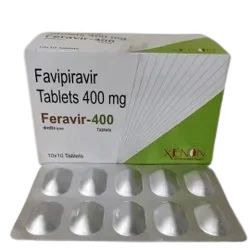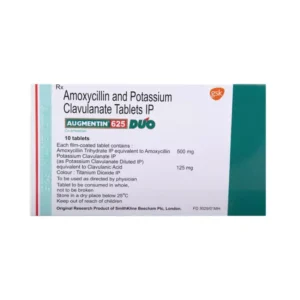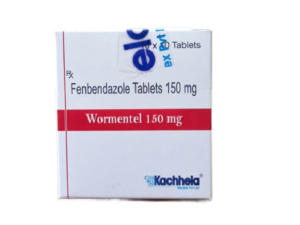Description
| Active Ingredient (Generic Name): | Azithromycin |
| Indication: | Bacterial infections |
| Manufacturer: | Cipla Ltd |
| Packaging: | 5 Tablets in 1 Strip |
| Strength: | 500 MG |
| Delivery Time: | 6 To 15 days |
| SKU: | Azee 500 Mg |
Azee 500 mg is the brand name for Azithromycin 500 mg, an antibiotic medication used to treat a wide range of bacterial infections. Azithromycin belongs to the macrolide class of antibiotics and works by inhibiting the growth of bacteria, which helps treat bacterial infections effectively.
Uses of Azee 500 mg:
Azee 500 mg is used to treat various types of bacterial infections, including:
- Respiratory Tract Infections:
- Pneumonia (lung infection)
- Bronchitis (inflammation of the airways)
- Sinusitis (sinus infection)
- Pharyngitis (throat infection)
- Ear Infections:
- Otitis media (middle ear infections)
- Skin Infections:
- Cellulitis (infection of the skin)
- Impetigo (bacterial skin infection)
- Sexually Transmitted Infections (STIs):
- Chlamydia
- Gonorrhea (often treated with a combination of antibiotics)
- Other Bacterial Infections:
- Tonsillitis
- Conjunctivitis (eye infections)
- Chancroid (bacterial ulcerative infection)
- Whooping cough (pertussis)
How It Works:
Azithromycin (Azee) works by binding to the ribosomes of bacteria, which inhibits protein synthesis, effectively preventing the bacteria from growing and multiplying. This action helps to treat a wide range of bacterial infections. Since Azithromycin is a broad-spectrum antibiotic, it targets many different bacteria, making it effective for treating various infections.
Dosage:
The dosage of Azee 500 mg varies depending on the condition being treated:
- For most infections: Azithromycin 500 mg is typically taken as a single dose on the first day (for example, 500 mg once daily) followed by 250 mg once daily for 4 more days. This regimen is common for respiratory infections.
- For sexually transmitted infections: A single dose of 1 gram (1000 mg) of Azithromycin may be prescribed, depending on the infection.
It’s crucial to follow the doctor’s prescription and complete the full course of treatment to avoid incomplete eradication of the bacteria and prevent resistance.
Side Effects:
Common side effects of Azee 500 mg may include:
- Diarrhea
- Nausea or vomiting
- Stomach pain or cramps
- Fatigue
- Headache
- Dizziness
Serious side effects (although rare) can include:
- Severe allergic reactions (rash, itching, swelling, difficulty breathing)
- Liver problems (yellowing of the skin or eyes, dark urine)
- Heart problems (e.g., irregular heartbeats or QT prolongation)
- Hearing loss (rare, typically with higher doses or prolonged use)
- Severe diarrhea (Clostridium difficile-associated diarrhea)
Precautions:
- Allergies: Avoid Azithromycin if you have a known allergy to azithromycin, other macrolide antibiotics (e.g., erythromycin), or any ingredients in the medication.
- Liver or kidney problems: Azithromycin is processed by the liver, so if you have liver disease, your doctor may adjust the dosage or monitor you closely.
- Heart issues: Azithromycin can affect heart rhythm, especially in those with a history of heart problems or arrhythmias.
- Pregnancy and breastfeeding: Azithromycin is considered generally safe during pregnancy, but it should be used only if necessary. Azithromycin passes into breast milk, so consult your doctor before breastfeeding.
Drug Interactions:
Azithromycin can interact with certain medications, including:
- Antacids containing aluminum or magnesium (which may decrease the absorption of Azithromycin, so take them 2 hours apart)
- Warfarin (a blood thinner), which may require dosage adjustments
- Digoxin (for heart conditions), as Azithromycin may increase digoxin levels
- Antihistamines or other antibiotics may interact with Azithromycin, potentially leading to side effects.
Always inform your healthcare provider about any other medications you’re taking, including over-the-counter drugs and supplements.
How to Take Azee 500 mg:
- Oral administration: Take Azee 500 mg tablets with a glass of water, with or without food. However, some people find it easier on their stomach if taken with food.
- Timing: It’s often taken once a day. Take it at the same time each day to help remember your dose.
- Complete the full course: Even if you feel better, complete the prescribed course of treatment to ensure the infection is fully cleared.
Missed Dose:
If you miss a dose, take it as soon as you remember unless it’s almost time for the next dose. Do not double the dose to make up for a missed dose.
Conclusion:
Azee 500 mg (Azithromycin) is a widely used antibiotic for treating a variety of bacterial infections, especially respiratory and skin infections, as well as sexually transmitted infections. While it is effective, it’s important to follow the prescribed dosage and complete the full course of treatment to avoid bacterial resistance and ensure the infection is properly treated. If you experience any serious side effects or symptoms of an allergic reaction, contact your doctor immediately.
1. What is Azee 500 mg used for?
Azee 500 mg is an antibiotic used to treat various bacterial infections, including:
- Respiratory tract infections (e.g., pneumonia, bronchitis)
- Ear infections (e.g., otitis media)
- Skin infections (e.g., cellulitis, impetigo)
- Sexually transmitted infections (e.g., chlamydia, gonorrhea)
- Other infections like tonsillitis, conjunctivitis, and whooping cough.
2. How does Azee 500 mg work?
Azee (Azithromycin) is a macrolide antibiotic. It works by inhibiting protein synthesis in bacteria, which prevents them from growing and multiplying, helping to eliminate the infection.
3. How should I take Azee 500 mg?
Azee 500 mg is usually taken orally as a tablet. It can be taken with or without food, but it’s best to follow your doctor’s instructions. Typically, it is taken once daily, either as a single dose or part of a multi-day regimen.
4. What if I miss a dose of Azee 500 mg?
If you miss a dose, take it as soon as you remember. If it’s almost time for your next dose, skip the missed dose. Do not take two doses at once to make up for a missed dose.
5. Can I stop taking Azee 500 mg once I feel better?
No, it is important to finish the full course of treatment, even if you feel better before the medication is finished. Stopping the medication early can lead to the infection returning or contribute to antibiotic resistance.






rx-admin –
I appreciate that this product is gentle on my stomach yet provides noticeable results. My digestion has improved, and I feel more vibrant and energized throughout the day. It’s now part of my daily routine.